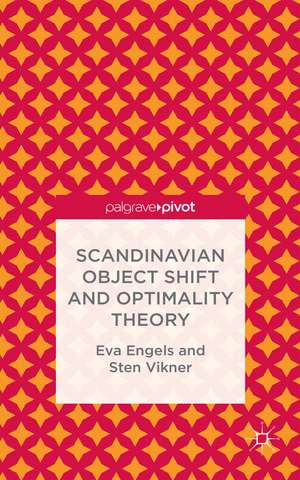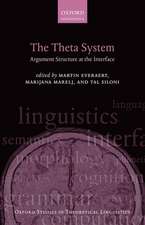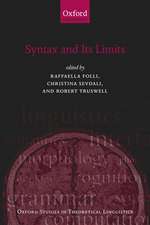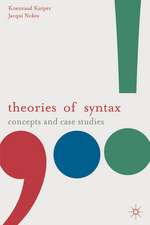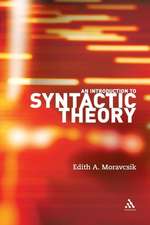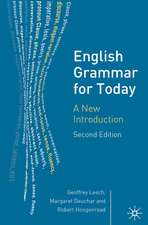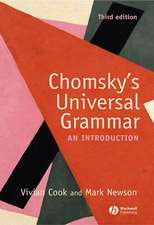Scandinavian Object Shift and Optimality Theory
Autor E. Engels, S. Vikneren Limba Engleză Hardback – 30 mai 2014
Preț: 386.00 lei
Nou
Puncte Express: 579
Preț estimativ în valută:
73.87€ • 80.21$ • 62.05£
73.87€ • 80.21$ • 62.05£
Carte tipărită la comandă
Livrare economică 22 aprilie-06 mai
Preluare comenzi: 021 569.72.76
Specificații
ISBN-13: 9781137431639
ISBN-10: 1137431636
Pagini: 154
Ilustrații: XIV, 154 p.
Dimensiuni: 140 x 216 x 14 mm
Greutate: 0.37 kg
Ediția:2014
Editura: Palgrave Macmillan UK
Colecția Palgrave Pivot
Locul publicării:London, United Kingdom
ISBN-10: 1137431636
Pagini: 154
Ilustrații: XIV, 154 p.
Dimensiuni: 140 x 216 x 14 mm
Greutate: 0.37 kg
Ediția:2014
Editura: Palgrave Macmillan UK
Colecția Palgrave Pivot
Locul publicării:London, United Kingdom
Cuprins
PART I: OBJECT SHIFT 1. Introduction 2. Object Shift 3. Optimality Theory 4. An Optimality Theory Analysis of Object Shift 5. Conclusion PART II: OBJECT SHIFT IN REMNANT VP-TOPICALISATION CONSTRUCTIONS 6. Introduction 7. V°-Topicalisation vs. Remnant VP-topicalisation 8. Object Shift and Remnant VP-topicalisation in Optimality Theory 9. Conclusion
Notă biografică
Sten Vikner is Associate Professor in English linguistics, University of Aarhus, Denmark. His previous publications include Verb Movement and Expletive Subjects in the Germanic Languages and Studies in Comparative Germanic Syntax (co-edited), and he is the Editor of the Nordic Journal of Linguistics. He researches Germanic comparative syntax, with a particular interest in how and why word order varies between languages.
Eva Engels is Postdoctoral Researcher in the Department of Aesthetics and Communication at Aarhus University, Denmark. Her previous publications include Optimizing Adverb Positions as well as various book chapters and journal articles. Her research focuses on the comparative syntax of the Germanic languages and on how Optimality Theory applies to syntax.
Eva Engels is Postdoctoral Researcher in the Department of Aesthetics and Communication at Aarhus University, Denmark. Her previous publications include Optimizing Adverb Positions as well as various book chapters and journal articles. Her research focuses on the comparative syntax of the Germanic languages and on how Optimality Theory applies to syntax.
